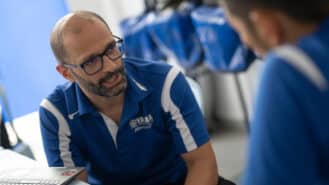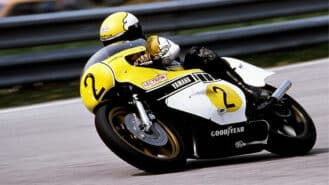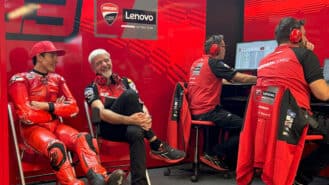I’ve never done this before, but I think now the time is right. It’s time to come out: as a Valentino Rossi fan. Social media has been so poisoned by Rossi fanatics in recent weeks that I’ve been judged guilty a thousand times for the crime of trying to be objective in the face of the facts. I’m not the only one. Many other MotoGP journalists, respected for years and years by their readers, have been subjected to the same abuse for the same crime of attempting to uncover the truth.

I’ve liked Rossi since the summer of 1996 (below), when he started hanging out in the press room on Sunday evenings, laughing and joking with journalists and generally having a fun time like no other rider. A couple of years later we got together and I started writing his columns, which required me to hunt him down on Sunday evenings (even then not an easy proposition) to chat about the race and what he’d been up to in the previous week or so. One of these chats was conducted beside a swimming pool in Rio de Janeiro, Rossi full of beer and champagne, while his friends and crew got flung in the pool, just a few hours after he had won the 250 title. He was always funny; bubbling over with enthusiasm for racing and for life itself.
Our contract regarding his columns – which were published in ‘bike magazines around the world – was hilariously amateurish and all the better for it. He gave me half an hour of his time at each race and I gave him a CD. I was deep into London club-land at the time, so I brought along weird drum and bass records, like Goldie’s game-changing Timeless. “Strange music, this Goldie,” he grinned.

Another couple of years later he agreed to let me write his biography, which entailed many hours hunkered down in his rather gloomy serviced apartment in St James Square, London.
We sat there talking about his past, while best-mate Uccio (Salucci) lay snoring on the sofa, sleeping off another heavy all-nighter in some bangin’ house club. Usually, Rossi’s latest 500cc winner’s trophy sat on the sideboard among the detritus of a crazy life lived on the road.
Writing his biography also took me to Italy where I spent time with his wonderful dad (one of my childhood racing heroes) and his warm and bright mother. His mum told me plenty of interesting tales about her boy, but what struck me the most was the stories he told her when he got home from the minimoto track, buzzing on adrenaline and talking ten to the dozen. She said it wasn’t just the racing that Valentino loved, but everything about paddock life. He loved it all and that is surely the main reason for his astonishing longevity.
I like Rossi because I like the way he races, like a warrior. Even more than that I like him as a person: bright, funny, liberal-minded, as are his parents. I have little doubt he’s a good human being; something which can’t be said of many racers clawing their way to the top of a cruel and vicious sport.
Vote for Rossi to be inducted into the Motor Sport Hall of Fame
He was great on a 250, sublime on a 500 and pretty much unbeatable on Honda’s first four-stroke MotoGP bike, even though he really missed the razor-edged thrills of a 500cc two-stroke.
As a journalist it is our job to be disinterested, unbiased, unpartisan, but Rossi was so successful and so likeable that it was pretty much impossible to write anything bad about him back then. Even when the competition got tougher and his ruthlessness started to seep out, I didn’t mind. I never thought him to be meek and mild. He’s a bike racer, a protagonist in one the world’s fastest, deadliest sports. You don’t get to be king of the class of kings without being mean, selfish, egotistical and vicious, when the occasion demands. Ignore the smiles and the friendly waves. That’s just the cheery grin of the dedicated assassin.

First there were his clashes – both on the track and off it – with Max Biaggi (above) and Sete Gibernau. Essentially, the Roman and the Spaniard were pushovers for Rossi. Then came Nicky Hayden, such a gentleman during their race for the 2006 championship, during which Rossi suffered all manner of ill luck, that their duel was the epitome of good sport. You could not find a sadder contrast between their enthralling battle at the Valencia finale and the bitterness of last Sunday’s Valencia showdown.
Then came Casey Stoner, a rider whose talent could match and sometimes better the sport’s most popular rider. Rossi is highly intelligent, so he knew his life was getting more complicated when the new generation arrived, bringing new skills and new hunger with them. Next came Jorge Lorenzo. Rossi referred to these men as sharks, circling him for the kill.
And then Marc Marquez arrived. Finally, here was a rival made in Rossi’s own image. Marquez had watched and worshipped Rossi ever since he had been a little kid, so it’s no surprise he turned out to be a grinning assassin, just like his hero.
At Catalunya in 2008 when Marquez was already a famous schoolboy racer he begged a Spanish journalist and Spanish photographer to introduce him to his hero, so he could give him a present: a toy car. “Ah,” said Rossi. “So you are the brave Marc…”
From the archive: Oxley on Marc Marquez (2014)
They say you should never meet your heroes and perhaps they are right. Rossi had been the most ruthless man on the racetrack until Marquez turned up. Whenever it came to hand-to-hand combat with his earlier rivals, Rossi always came out on top. Biaggi, Gibernau, Stoner, they all felt the sting of his killer instinct. But here was a mad-keen youngster who was just dying to give as good as he got.

I saw no evidence that Marquez helped Lorenzo at Phillip Island. I saw every evidence that he did so at Sepang, but this wasn’t his prime intention, which was to mess with Rossi, who had insulted him in public several days earlier. Marquez’s Sepang onslaught went like this: so you thought I was messing with you in Australia did you? Well, check this out, this is what it’s like when I mess with you.
Rossi, with some justification, blew his top. And for that he was sent to the back of the grid, a penalty that effectively ended his championship chances. He has since admitted his verbal attack was a mistake, as was his decision to argue with Marquez mid-race. “I regret that I went wide and didn’t follow my normal line,” he said at Valencia. In effect, he lost the title on that Thursday afternoon at Sepang.
I’m still a Rossi fan. I also love history. If Rossi had won the title on Sunday it would’ve been a hugely historical moment: a competitor in a savage, pitiless sport winning a tenth Grand Prix world title 19 years after his first. That’s almost double Michael Schumacher’s F1 record of 11 years between his first and last titles. It would’ve been a superhuman achievement, not only unique in motor sport, but across all sports.
Which brings us to the ten-million-dollar question about what went down on Sunday. Lorenzo won the race and the title, Marquez finished a close second, with Dani Pedrosa third and Rossi a distant but heroic fourth after cutting his way through from 26th on the grid.

If both Repsol Hondas had managed to get past Lorenzo, then Rossi would have been champion. But they didn’t. Perhaps Marquez was riding shotgun to Lorenzo. But if that’s true, why was he on the M1’s tail throughout the race, with his body language – loud as always! – telling us he was building towards a last-lap attack, most likely at the final hairpin, which would give Lorenzo no chance to come back at him? And why didn’t he give Lorenzo an easy time, following him around at a respectful distance, rather than hassling him lap after lap? Those are all questions to which everyone has their own answers. The only fact was that Lorenzo’s M1 had better acceleration grip, so Marquez could never get the drive he needed to set up a pass at the next corner.
It is also worth pointing out that Valencia is a grim track for overtaking. It’s a slow, narrow, one-line, follow-my-leader circuit with a dead-slow entry onto its only straight. It is the polar opposite of wide, fast and open Phillip Island. The Valencia layout leaves little opportunity for riders to prepare a pass exiting one corner and into the next, especially on heavy MotoGP bikes with traction control and carbon brakes. At five of the last nine dry-weather MotoGP races at the track there wasn’t a single overtaking manoeuvre at the front. Not one.
Podcast on Rossi, Stoner, Doohan, Duke, Dunlop, Hailwood, Lawson, Rainey, Roberts, Schwantz, Sheene and Spencer with Jeremy McWilliams and Mat Oxley
On Monday I attempted to uncover the truth by wandering the paddock, searching for respected, disinterested observers who have been involved in Grand Prix racing for decades. I asked factory engineers, team managers, former riders, current riders and mechanics, while avoiding those with an axe to grind (in other words, members of the factory Honda and Yamaha squads).
I gave all these people an anonymous voting slip that featured three columns. If they believed Rossi was correct in his claims of a stitch-up then they put a cross in the Rossi column. If they believed Marquez wasn’t mothering Lorenzo, then they put their cross in the Marquez column.


The voting ended in a dead heat, with several don’t knows and a few non-signees, mostly riders who ran a mile when I asked them the question. The result confirms that even the most knowledgeable people in the sport are unsure of what really happened.
Another fact is that Lorenzo won the championship with seven start-to-finish victories, a unique achievement which proves he’s quite difficult to pass once he has a clear track and can switch into robot mode.
Lorenzo was undoubtedly the fastest man out there in 2015. Rossi very nearly won the championship with four victories, including his win in the Silverstone rain (above), undoubtedly one of his greatest rides of all. He was certainly better at adapting to circumstances than his team-mate. He only made one mistake all year: starting that war of words with Marquez in the Sepang pre-event press conference. If he had kept his thoughts to himself that day, the race would probably have gone off as normal and he would’ve been in the thick of the fight for the title at Valencia. That would’ve been worth watching.

I have a theory – entirely unsubstantiated – that Rossi’s greatest wish was to win the world title so he could dedicate the crown to his late, great friend Marco Simoncelli. If there’s any truth in this then perhaps his emotions interfered with his normal thought processes, which is always a disaster in racing.
Despite the grim goings-on of recent weeks and despite his fanatical followers treating him like a deity who can do no wrong, I’m still a Rossi fan. But then I’m also a Marquez fan because he has that same warrior spirit that first attracted me to Rossi.
Lorenzo’s character has never really grabbed me but when I stand trackside, watching him float through corners at impossible angles of lean, his bike perfectly settled, I’m in awe. No one else rides like that.
I’ve also been impressed by his ability to keep his head and ride an inch-perfect race in front of thousands of booing fans wearing yellow-tinted specs. I have a daft contrary streak running through me, so the more he’s hated by fans who refuse to acknowledge his brilliance, the more I like him.
So now I like them all. I like watching motorcycle racing, appreciating these characters living their extreme lives and watching the drama and chaos unfold, like a war without the shooting. I don’t usually care who wins; what’s the point of hoping for a result over which you have no control? If I wanted to be tribal, partisan and blindly loyal I’d give up bikes and get into football.











